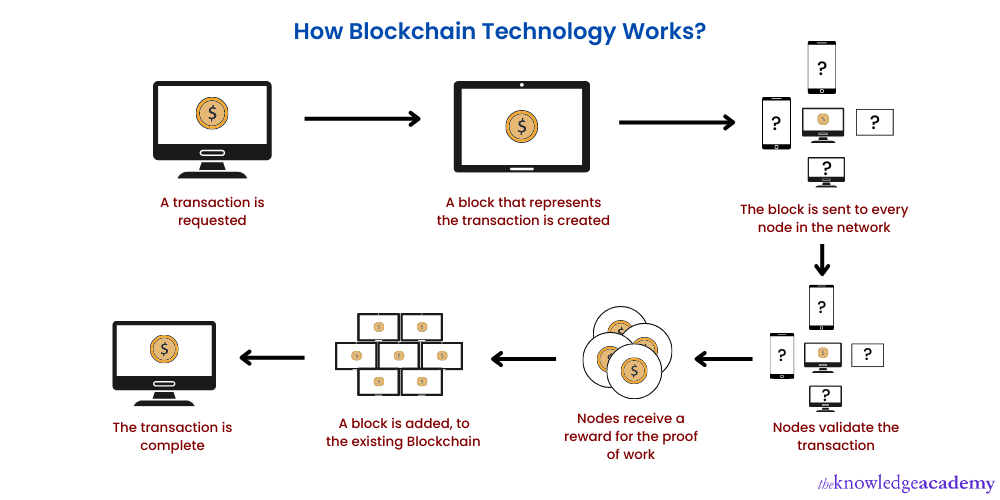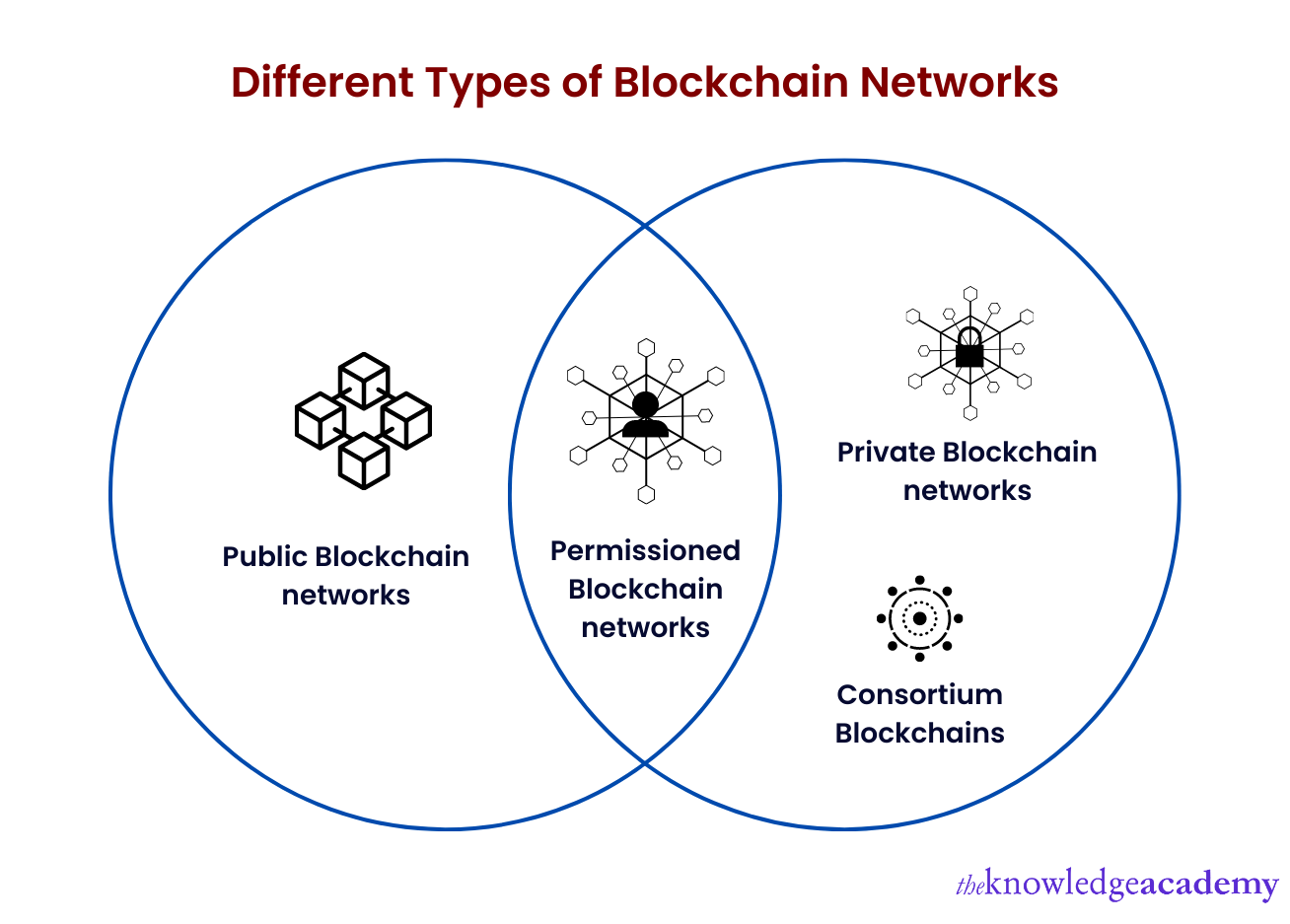We may not have the course you’re looking for. If you enquire or give us a call on 01344203999 and speak to our training experts, we may still be able to help with your training requirements.
Training Outcomes Within Your Budget!
We ensure quality, budget-alignment, and timely delivery by our expert instructors.

A business is typically driven by information. It is best if the information is received quickly and accurately. Blockchain is the best technology. Do you know What is Blockchain? It offers real-time, shareable, and fully transparent data kept on an immutable ledger that is accessible only by authorised network members.
It is the reason in 2021, the market for Blockchain Technology was estimated to be worth £4.92 billion. By 2030, it is predicted to rise to £1041.12 billion, or perhaps to a compound annual growth rate of 82.8%.
Blockchain is a decentralised, immutable ledger that makes it easier to track assets and process data in a corporate network. Blockchain Technology has the ability to track orders, payments, finances, production, and much more. Additionally, because everyone has access to the same version of the truth, you can see every aspect of a transaction from beginning to end, increasing your confidence and introducing you to new prospects.
Table of Contents
1) What is Blockchain?
2) Why is Blockchain important?
3) What are the key elements of Blockchain?
4) How Blockchain Technology works?
5) How do Different Industires Use Blockchain?
6) Benefits of Blockchain
7) Drawbacks of Blockchain
8) Different Types of Blockchain Networks
9) Is Blockchain Secure?
10) Bitcoin vs Blockchain
11) Blockchain vs Banks
12) Some Interesting use Cases and Applications of Blockchain
13) Conclusion
What is Blockchain?
A shared database or ledger that is accessible by all of the nodes in a computer network is known as Blockchain Technology. A Blockchain is a digital database that electronically stores data. The most well-known use of Blockchain Technology is for preserving a secure and decentralised record of transactions in cryptocurrency systems like Bitcoin.
Multiple transactions are included in each block of the chain, and every time a new transaction takes place on the Blockchain, a record of that transaction is posted to the ledger of every user. Distributed Ledger Technology (DLT) refers to a decentralised database that is governed by numerous users. The uniqueness of a Blockchain is that it fosters confidence without the requirement for a reliable third party by ensuring fidelity and blockchain data privacy.
Preparing for a Job Interview? Check out our Blockchain Interview Questions!
Why is Blockchain important?
For ages, organisations and individuals have used traditional database technologies that posed several data storage, processing and transfer issues. However, this task has become easier and faster with the introduction of Blockchain Technology. It has become integral to various industries- finance, media and communication, and retail. It is important because:
1) A Blockchain is a particular kind of shared database that varies from other traditional databases; Blockchains save data in blocks that are subsequently connected via cryptography.
2) Blockchain is utilised in the context of Bitcoin in a decentralised manner, ensuring that no one user or organisation has power but rather that all users collectively maintain control.
3) Since decentralised Blockchains are immutable, the data entered into them cannot be changed. This implies that transactions made using Bitcoin are publicly visible and permanently recorded.
4) On a Blockchain network, practically anything of value may be recorded and traded, lowering risk and increasing efficiency for all involved due to its tamper-proof system to record transactions.
The above stated features of Blockchain Technology makes its demand grow higher and higher in each and every industry across domains.
Learn the fundamentals of Blockchain 101 and Ethereum. Sign up for our Ethereum Developer Training now!
What are the Key Elements of Blockchain?
The fundamental elements of Blockchain are:
1) Shared ledger- The shared ledger's immutable record of transactions is available to all network users. This shared ledger eliminates the duplication of effort that is inherent in conventional corporate networks by simply recording transactions once.
2) Permissions- Permissions guarantee the security, authenticity, and verifiability of transactions. Organisations can more easily adhere to data protection laws like those outlined in the Health Insurance Portability and Accountability Act (HIPAA) and the EU General Data Protection Regulation (GDPR) with the option to restrict network participation.
3) Smart contracts- A set of rules, referred to as a smart contract, is recorded on the Blockchain and is automatically carried out to speed up transactions. A smart contract can specify parameters for corporate bond transactions, stipulate how much must be paid for travel insurance, and much more.
4) Consensus- With consensus, the network-verified transaction is approved by all parties. Blockchains have a variety of consensus processes, such as multi-signature, proof of stake, and PBFT ( Practical Byzantine Fault Tolerance).
5) Immutable records- Once a transaction has been added to the shared ledger, no participant may alter or interfere with it. A subsequent transaction must be added to undo an error in a transaction record before both transactions are displayed.
How Blockchain Technology works?

You may have observed that several companies have been incorporating Blockchain Technology in recent years. But how does Blockchain Technology actually operate? Is this a meaningful modification or merely an addition? Let's start by understanding how Blockchain Technology functions since it is still in its growing phase and has the potential to be revolutionary in the future.
1) As each transaction occurs, it is recorded as a “block” of data: These exchanges demonstrate the movement of an asset, which may be a tangible good(product) or an intangible good (intellectual). Who, what, when, where, how much, and even the condition—such as the temperature of a food shipment—can all be recorded in the data block.
2) Each block is connected to the ones before and after it: As an object moves from one location to another or ownership changes, these blocks create a chain of data. The blocks connect securely together to prevent any blocks from being modified or a block from being introduced between two existing blocks, and the blocks certify the precise timing and order of transactions.
3) Transactions are blocked together in an irreversible chain – a Blockchain: Each new block reinforces the prior block's verification and then, consequently, the entire Blockchain. This gives the Blockchain its crucial strength of immutability and makes it tamper-evident. By doing this, you and other network users may create a trusted ledger of transactions and eliminate the chance of tampering by unauthorised individuals.
Learn how bitcoins work and how to secure bitcoins. Register for our Bitcoin and Cryptocurrency Course now!
How do different industries use blockchain?
Blockchain is being used by several businesses to reduce friction, create trust, and unleash new values. The following is a list of such industries:
1) Healthcare – Blockchain Technology in healthcare can help record patients' health and personal data and manages clinical trials and medicine supply chains. It also helps healthcare researchers to unlock genetic codes. It also helps maintain smart contracts for medical insurance, remote monitoring, and much more.
2) Government – It simplifies the process of filing taxes, issuing birth certificates, and other government processes that need paperwork and are potential fraud entities.
3) Supply Chain – These industries can efficiently complete transactions without third-party involvement. Blockchain in supply chain also facilitates the integration of financial and logistics services.
4) Media and Advertising – Companies can verify and maintain copyright data to improve productivity and reduce costs in copyright processing.
5) Financial Services – Banks and stock exchanges use Blockchains Technology to maintain online payments, accounts and market trading.
6) Travel and Transportation – Blockchain helps businesses track truck fleets, routes, traffic incidents, and other related operations.
Benefits of Blockchain
Operations frequently squander time and resources on third-party validations and duplicate record-keeping. Systems for preserving records may be susceptible to fraud and online threats. Data verification may be slowed by a lack of openness. And the number of transactions has multiplied since the introduction of IoT (Internet of Things). We need a better solution because all of this slows down the businesses and depletes the bottom line. Enter Blockchain.
Some of the key benefits of Blockchain are as follows:
1) Greater trust- With Blockchain, you may have peace of mind knowing that, as a part of a members-only network, you are receiving timely and accurate information and that your private Blockchain records will only be communicated with network members to whom you have specifically authorised access.
2) Highly secure- All network participants must agree that the data is accurate, and since all validated transactions are permanently stored, they cannot be changed. A transaction cannot be deleted by anyone, not even a system administrator.
3) Automation efficiency- Time-consuming record reconciliations are reduced when a distributed ledger is shared among network users. Additionally, a set of instructions known as a smart contract can be saved on the Blockchain and carried out automatically to speed up transactions.
4) High accuracy- Blockchain Technology has proved helpful as it provides high accuracy in the data processing. Businesses can trust this technology as it removes any human (susceptible to fraud) involvement in data verification and transfer.
5) Transparent- Blockchain is open-source software with the allowance for everyone and anyone to view its code. This permits the auditors to review and upgrade cryptocurrency systems.
6) Decentralisation- Blockchain is open-source software with the allowance for everyone and anyone to view its code. This permits the auditors to review and upgrade cryptocurrency systems.
Drawbacks of Blockchain
Although Blockchain has proved to be one of the most reliable technologies in today's world, it also has a flip side. Like every other technological advancement, this also comes in handy with certain blockchain disadvantages.
So, let’s learn what these are:
1) Expensive technology- Users continue to make payments to validate transactions on this platform. It is primarily the Blockchain that does not use cryptocurrency. Thus, the miners are required to pay to validate transactions.
2) Unauthorised trading- Since miners are allowed to change and update Blockchain networks, it is prone to illegal trading and attacks by malicious entities. As a result, it becomes easily migrate cryptocurrencies.
3) Speed and data inefficient- Blockchain size is one of the significant issues that are yet to be dealt with by the experts. This reduces the scalability of Blockchains moving forward. Apart from that, the bitcoin network can only manage about seven transactions per second which are lower than other cryptocurrencies.
4) Difficult to regulate- The hold of cryptocurrency networks with the government makes it challenging to end. As the decentralised network grows, governments could theoretically prohibit owning cryptocurrencies and even participating in their networks.
Different Types of Blockchain Networks

Building a Blockchain network can be done in several ways. They may be permitted, public, private, or constructed by a consortium.
1) Public Blockchain networks- Bitcoin and other cryptocurrencies have their roots in public Blockchains, which also helped spread Distributed Ledger Technology (DLT) to a broader audience. Public Blockchains also assist in removing some difficulties and problems, such as centralisation and security issues. Rather than being kept in one place, data is spread throughout a peer-to-peer network using DLT. For authenticating information, a consensus technique is used; proof of stake (PoS) and proof of work (PoW) are two popular consensus methods.
2) Private Blockchain networks- A private Blockchain network is a decentralised peer-to-peer network, just like a public Blockchain network. However, one entity controls the network's governance, carrying out a consensus protocol and keeping track of the shared ledger. Depending on the blockchain use case, this can significantly increase participant confidence and trust. It is possible to host a private Blockchain on-site and to operate it behind a company's security system.
3) Permissioned Blockchain networks- Permissioned Blockchain networks, also referred to as hybrid Blockchains, are private Blockchains that grant approved users privileged access. These kinds of Blockchains are frequently put up by businesses in order to combine the finest aspects of both worlds. They also allow for greater structure when deciding who can join in the network and in which transactions.
4) Consortium Blockchains- The duties of maintaining a Blockchain might be split among several groups. Who is permitted to submit transactions or access the data is decided by these pre-selected organisations. When everyone involved in a business transaction needs to have authorisation and share ownership of the Blockchain, a consortium Blockchain is the best option.
Is Blockchain Secure?
The introduction of Blockchain Technology to businesses has done miracles. Due to its decentralised network, it has gained trust across the world. But is it secure to work with? Let's find out:
1) New blocks are stored chronologically, i.e., every new block is added at the end of the chain. Thus, it becomes difficult to reach and tamper with the block contents.
2) Even if there is some malicious attack on any crypto, each block has hash encryption and the previous block's hash. If the hash codes are altered, they will no longer align with everyone else's copy over the network, thus, providing network security.
3) The growing cryptocurrency networks make it difficult for attackers to reach every copy. Thus, they will have to invest high amounts of money and resources.
4) In case of any attack, the members can develop a new version of the chain that has not been affected, making the attacker’s efforts go to waste.
Thus, it is developed so that participating in the network is far more economically useful than attacking it.
Bitcoin vs Blockchain
While the Blockchain was introduced in 1991 by Stuart Haber and W. Scott Stornetta with an idea to implement a system where document timestamps could not be tampered with, this plan became fully functional in 2009 with the introduction of Bitcoin. It can be said that the use of Bitcoin is based on Blockchain.
Blockchain is used to record a ledger payment done in Bitcoins. However, it can also be used to permanently record any amount of data points in various forms, such as vote counts, product inventories, transactions, etc. Most importantly, Bitcoins remain anonymous, while Blockchain includes transparency.
Blockchain vs Banks
Blockchain is one of the toughest rivals of the finance sector. It is mainly due to the elimination of many steps by Blockchain that was previously done by human effort. Thus, you see that there are many differences between Blockchain and Banks. Let's have a look at some of them:
1) Banks have fixed working hours for the employees, restricting services within a time frame. On the other hand, Blockchains are available every hour of the day.
2) Blockchain has a nominal and variable fee, and users can limit the amount they are willing to pay. However, you can transfer money using credit cards, mobile applications, and cheques.
3) While Blockchain may take up to 15 minutes to complete a transaction, adjusting to the network congestion, bank transactions take a day or two to fulfil the same.
4) An user's bank account information is stored on the bank's private servers and is held by the client. The user only has the power to secure their information from spilling out and must depend upon securing the bank's server. At the same time, a Bitcoin in Blockchain remains anonymous.
5) The bank needs to know its customers in order to maintain its accounts and products. But, the Blockchain network allows members to participate without revealing their identities.
Some Interesting use cases and applications of Blockchain
Wondering how Blockchain Technology is applied in these industries? Well, below are some of the Blockchain applications for your better understanding:
1) INBLOCK and LinuxOne developed Blockchain Technology that contributes to enhancing bitcoin security in financial services. By addressing technological issues with cryptocurrencies, it hopes to increase the speed, convenience, and security of the exchange of digital assets.
2) IBM Blockchain enables the evolution of new ecosystems and new business models, making it easier to revolutionise healthcare outcomes and improve the quality of care.
3) Golden State Foods maintains food quality with the use of Blockchain Technology, Artificial Intelligence (AI), and the Internet of Things (IoT).
4) The Home Depot and IBM Blockchain are building better connections and achieving faster outcomes. To reduce the number of vendor complaints and speed up dispute resolution, The Home Depot is adopting IBM Blockchain to obtain real-time, shareable, and trustworthy information on the goods throughout the shipping and receiving
Conclusion
Blockchain Technologies are developing at an unprecedented rate because of cryptocurrency, with numerous real-world uses already being deployed and investigated. Every investor in the country has heard of the buzzword "Blockchain," which has the potential to reduce the number of intermediaries while increasing accuracy, efficiency, security, and cost of business and government processes.
Even though we briefly touched on the possibilities of Blockchain applications across industries in this blog, the employment opportunities in this area are expanding rapidly. Any professional should always try to get an edge over the competition.
Check out our most popular Blockchain Training Courses on this developing field of Blockchain Technology.
Frequently Asked Questions
Upcoming Advanced Technology Resources Batches & Dates
Date
 Blockchain Training Course
Blockchain Training Course
Thu 11th Jul 2024
Thu 19th Dec 2024







 Top Rated Course
Top Rated Course



 If you wish to make any changes to your course, please
If you wish to make any changes to your course, please


